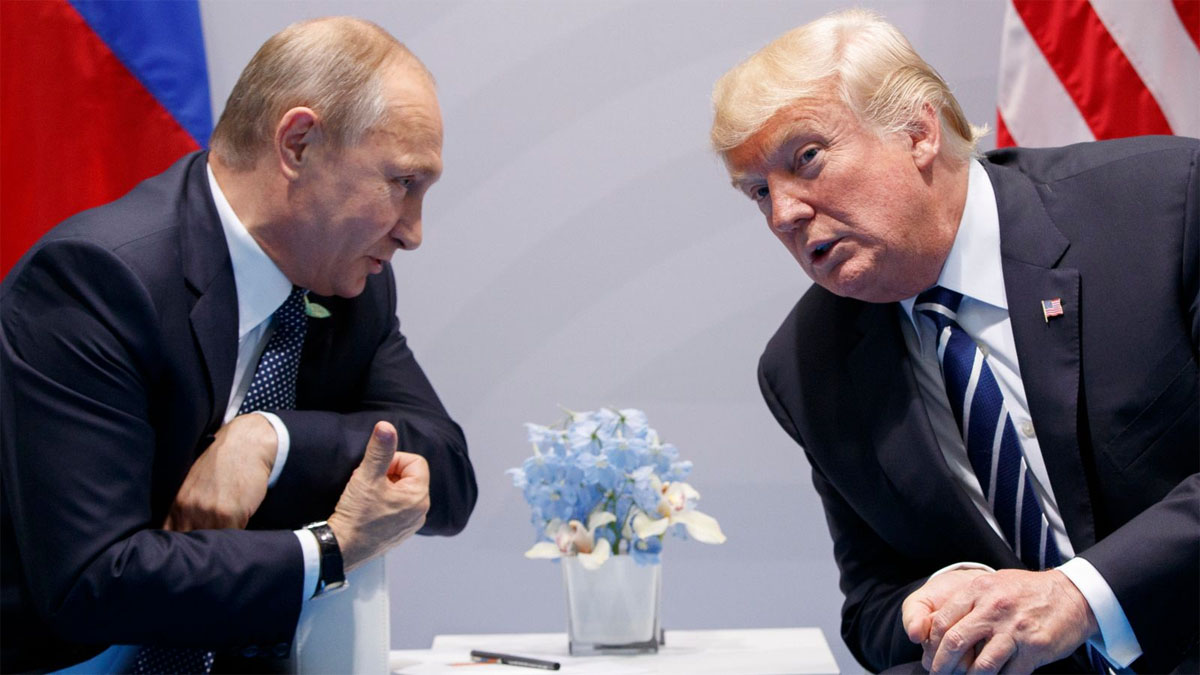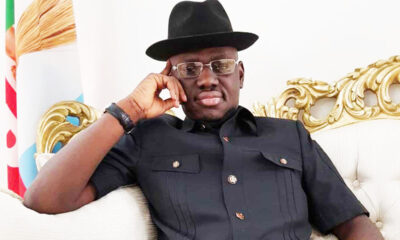International
Ceasefire negotiations: Trump ‘very angry’ with Putin

Ceasefire negotiations: Trump ‘very angry’ with Putin
Donald Trump has said he is “very angry” and “pissed off” with Russian President Vladimir Putin after weeks of attempting to negotiate a ceasefire in Ukraine.
In an NBC News interview, the US president criticised Putin for attacking Ukrainian President Volodymyr Zelensky’s credibility, and threatened to impose a 50% tariff on countries buying Russian oil if he did not agree to a ceasefire.
Last week, Putin suggested the possibility of a UN-run government in Ukraine to organise new elections and then begin peace talks.
Trump’s comments mark a change in tone towards Putin. Over the past six weeks, Trump has publicly harangued Zelensky and demanded numerous concessions from Ukraine’s president.
In turn, he has flattered Putin and largely given in to the Russian president’s demands.
European leaders had worried that Trump was cosying up to Putin.
But Trump’s comments on Sunday appeared to be a departure from that dynamic. It is the first time the US has seriously threatened Russia with consequences for dragging its feet in ceasefire negotiations, which would seem to put the diplomatic ball back in Moscow’s court.
NBC News reported that, in a 10-minute phone interview, Trump said he was very angry and “pissed off” when Putin criticised the credibility of Zelensky’s leadership, although the president has himself called Ukraine’s leader a dictator and demanded that he hold elections.
“You could say that I was very angry, pissed off, when… Putin started getting into Zelensky’s credibility, because that’s not going in the right location,” Trump said.
“New leadership means you’re not gonna have a deal for a long time,” he added.
READ ALSO:
When speaking about Putin, Trump said that the Kremlin knew of his anger, but noted that he had “a very good relationship” with the Russian leader and “the anger dissipates quickly… if he does the right thing”.
If Russia does not follow through with a ceasefire, Trump threatened to target its economy further if he thought it was Putin’s fault.
“If Russia and I are unable to make a deal on stopping the bloodshed in Ukraine, and if I think it was Russia’s fault – which it might not be… I am going to put secondary tariffs… on all oil coming out of Russia,” he said.
“There will be a 25% tariff on oil and other products sold in the United States, secondary tariffs,” Trump said, noting that the tariffs on Russia would come in a month without a ceasefire deal.
Secondary tariffs are sanctions on countries that do business with another country. They could constitute up to 50% on goods entering the US from countries still buying oil from Russia. The biggest such buyers by a long margin are China and India.
Zelensky wrote on social media following the interview that “Russia continues looking for excuses to drag this war out even further”.
He said that “Putin is playing the same game he has since 2014”, when Russia unilaterally annexed the Crimean peninsula.
“This is dangerous for everyone – and there should be an appropriate response from the United States, Europe, and all our global partners who seek peace.”
Trump said he would speak to Putin later in the week.
Moscow says the current Ukrainian authorities are illegitimate as President Zelensky has stayed in power beyond the end of his term and is therefore not a valid negotiating partner.
But Zelensky has stayed because elections have been put on hold, legally by martial law and practically by the chaos of war.
It would be almost impossible to hold a valid election with more than five million Ukrainian citizens displaced overseas and many hundreds of thousands away from home fighting on the front line.
READ ALSO:
- Ex-Rivers HoS wife cries for help over husband’s safety
- Fubara reacts as Ex-HOS, Nwaeke accuses him of bombing oil pipelines, Rivers Assembly
- Natasha: Emmanuel Uduaghan threatens to sue Senator Nwaebonyi
Russia launched a full-scale invasion of its neighbour, Ukraine, in February 2022. It currently controls about 20% of Ukrainian territory.
More than 100,000 people fighting for Russia’s military have now died as the war in Ukraine enters the fourth year, according to data analysed by BBC Russian, independent media group Mediazona and volunteers who have been counting deaths since the war began.
Ukraine last updated its casualty figures in December 2024, when President Volodymyr Zelensky acknowledged 43,000 Ukrainian deaths among soldiers and officers. Western analysts believe this figure to be an under-estimate.
Also in the NBC interview on Sunday, Trump said he was “not joking” when he said he would not rule out seeking a third term in the White House, despite it being prohibited by the US Constitution.
“A lot of people want me to do it,” Trump said. “But, I mean, I basically tell them we have a long way to go.”
During the call with NBC, he also again threatened to bomb Iran if it did not agree to a nuclear deal. Trump earlier this month sent a letter to the regime demanding negotiations.
“It will be bombing the likes of which they have never seen before,” he said, noting he would also impose secondary tariffs.
On Sunday, Iran’s president Masoud Pezeshkian said the country would not enter into direct negotiations with Washington concerning their nuclear programme, but indirect talks were possible.
“We don’t avoid talks; it’s the breach of promises that has caused issues for us so far,” he said. “They must prove that they can build trust.”
Ceasefire negotiations: Trump ‘very angry’ with Putin
BBC
International
Trump Halts Minnesota Immigration Crackdown After Fatal Shootings, Protests

Trump Halts Minnesota Immigration Crackdown After Fatal Shootings, Protests
The Trump administration has officially halted Operation Metro Surge, a controversial immigration enforcement operation in Minnesota, following widespread protests, political backlash, and the deaths of two U.S. citizens. The decision was announced by Tom Homan, the U.S. “border czar,” who confirmed that President Donald Trump approved ending the monthslong crackdown.
Operation Metro Surge, launched in December 2025, focused on the Minneapolis–St. Paul metropolitan area, deploying nearly 3,000 federal immigration officers at its peak. The operation aimed to detain undocumented immigrants, which the Department of Homeland Security (DHS) described as targeting “criminal illegal aliens.” However, reports indicate that many detainees had no criminal records, including children and U.S. citizens, raising concerns about the operation’s scope and fairness.
- Army University Professor Dies in Boko Haram Captivity After Nearly One Year
- MURIC Calls Proposed US Sanctions on Nigerian Muslims ‘Lopsided’
- Supreme Court Affirms Muslim Students’ Right to Worship at Rivers State University
The crackdown drew intense public opposition after anti-ICE protesters Renée Good and Alex Pretti were fatally shot during separate incidents in Minneapolis. The shootings intensified calls for accountability and prompted local and national criticism of federal enforcement tactics.
In a statement, Homan said, “I have proposed and President Trump has concurred that this surge operation conclude.” He noted that a drawdown of federal personnel had already begun, with a smaller contingent remaining temporarily to transition operations and coordinate with local authorities.
During the operation, DHS reported over 4,000 arrests, though critics highlighted the disproportionate impact on communities and families, emphasizing the humanitarian and civil liberties concerns arising from the surge.
Minnesota officials, including Governor Tim Walz and Minneapolis Mayor Jacob Frey, welcomed the decision, calling the operation an overreach that harmed communities and strained trust between law enforcement and residents. Civil rights groups also praised the halt but urged comprehensive immigration reforms to prevent future abuses.
The end of Operation Metro Surge marks a significant development in the national debate over immigration enforcement, sanctuary policies, and federal authority, highlighting the challenge of balancing border security with human rights and community safety.
Trump Halts Minnesota Immigration Crackdown After Fatal Shootings, Protests
International
Russia Escalates Digital Control with Attempted WhatsApp Block

Russia Escalates Digital Control with Attempted WhatsApp Block
WhatsApp has accused the Russian government of trying to completely block its messaging service in the country, a move aimed at steering users toward the state-backed app MAX. The Meta-owned platform said the effort, reported on February 12, 2026, threatens over 100 million users and undermines private, encrypted communication in Russia.
In a statement, WhatsApp said: “Today the Russian government attempted to fully block WhatsApp in an effort to drive people to a state-owned surveillance app. Trying to isolate over 100 million users from private and secure communication … can only lead to less safety for people in Russia. We continue to do everything we can to keep users connected.”
READ ALSO:
- Tumbler Ridge Massacre: Canada Investigates Shooter’s Mental Health, Police History
- Ex-Acting AGF Nwabuoku Admits Diverting N868.4 Million to Private Firms
- Kwankwasiyya Urges US Congress to Drop Kwankwaso’s Name from Bill
The attempt is part of a broader crackdown on foreign tech platforms in Russia. Authorities have previously restricted access to Facebook, Instagram, and targeted other services like Telegram. Reports indicate that Roskomnadzor, Russia’s communications regulator, removed WhatsApp from its national internet directory, forcing users to rely on VPNs to access the platform. Critics warn that such measures are designed to expand state surveillance and control over digital communication.
The government is actively promoting MAX, a domestic “super-app” similar to China’s WeChat, which combines messaging with other services. Rights advocates caution that the push toward MAX could compromise privacy protections that platforms like WhatsApp provide. Meanwhile, Kremlin officials have indicated that WhatsApp and other restricted apps could be restored if Meta complies with local data storage and regulatory laws.
WhatsApp’s statement emphasizes that the company will continue to work to keep its service accessible where possible, but the attempted block highlights Russia’s ongoing effort to enforce digital sovereignty and shift users toward state-controlled technology platforms.
Russia Escalates Digital Control with Attempted WhatsApp Block
International
Tumbler Ridge Massacre: Canada Investigates Shooter’s Mental Health, Police History

Tumbler Ridge Massacre: Canada Investigates Shooter’s Mental Health, Police History
Canadian authorities are intensifying investigations into the mental health history and prior police interactions of Jesse Van Rootselaar, the 18-year-old who carried out a deadly mass shooting in the remote mining town of Tumbler Ridge, British Columbia, on February 10, 2026. The tragedy has left the small community in mourning and raised national questions about gun control, mental health support, and law enforcement interventions.
According to RCMP Deputy Commissioner Dwayne McDonald, authorities are still unclear on the motive behind the attack, which is one of the deadliest school shootings in Canadian history. Van Rootselaar, a transgender woman who had dropped out of Tumbler Ridge Secondary School four years ago, first killed her mother and stepbrother before opening fire at the school, where she shot six more victims. The shooter later took her own life at the scene.
Investigators have confirmed that Van Rootselaar was known to police and had previous interactions with the public health system due to mental health concerns. Authorities are reviewing prior incidents, including earlier firearms seizures and her lapsed gun licence, to understand how warning signs were addressed before the massacre. British Columbia Premier David Eby said officials are working with the health system to determine “what interactions may have taken place” in the past.
READ ALSO:
- Ex-Acting AGF Nwabuoku Admits Diverting N868.4 Million to Private Firms
- Kwankwasiyya Urges US Congress to Drop Kwankwaso’s Name from Bill
- Liverpool Edge Sunderland 1-0 to Halt Impressive Home Streak
The victims include a 39-year-old female teacher and five students aged 12 and 13, with one child, 12-year-old Maya Gebala, in critical condition after trying to lock herself and classmates in a library during the attack. First responders arrived within minutes, but the scale of the violence left the tight-knit community of about 2,700 residents reeling. Hundreds gathered for a candlelight vigil to honour those killed and injured.
Prime Minister Mark Carney addressed parliament, describing Tumbler Ridge as a resilient, compassionate community of miners, teachers, and construction workers, and emphasised the need to learn from the tragedy. Flags across Canada have been lowered to half-staff for seven days in remembrance of the victims. Britain’s King Charles and Queen Camilla also expressed shock and sorrow over the massacre.
Schools in the area will remain closed for the remainder of the week as authorities continue their investigation into Van Rootselaar’s mental health background, police interactions, and access to firearms, seeking to understand how similar tragedies can be prevented in the future.
Tumbler Ridge Massacre: Canada Investigates Shooter’s Mental Health, Police History
-

 metro2 days ago
metro2 days agoIKEDC Sets Feb 20 Deadline for Customers to Submit Valid IDs or Face Disconnection
-

 Education2 days ago
Education2 days agoSupreme Court Affirms Muslim Students’ Right to Worship at Rivers State University
-

 metro2 days ago
metro2 days agoLagos Police Launch Manhunt for Suspect in Brutal Ajah Murder
-

 News2 days ago
News2 days agoAso Rock Goes Solar as Tinubu Orders National Grid Disconnection
-

 Business2 days ago
Business2 days agoNaira Could Trade Below ₦1,000/$ With Dangote Refinery at Full Capacity — Otedola
-

 metro2 days ago
metro2 days agoArmy University Professor Dies in Boko Haram Captivity After Nearly One Year
-

 International2 days ago
International2 days agoTrump Halts Minnesota Immigration Crackdown After Fatal Shootings, Protests
-

 Politics3 days ago
Politics3 days agoCity Boy Movement Receives Bus Donations from Zenco, Obi Cubana for Tinubu’s Campaign













